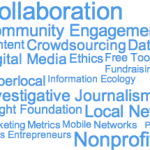Blog:
JA Resource Q&A: “See the documents that support fact-checks”
 Investigative Reporters and Editors teamed up with the Sunlight Foundation to create a guide to key national economic databases as a tool to fact-check political claims. Designed for journalists on deadline, useful and accessible to interested citizens, EconoCheck hopes to expand this service built initially for the 2012 election.
Investigative Reporters and Editors teamed up with the Sunlight Foundation to create a guide to key national economic databases as a tool to fact-check political claims. Designed for journalists on deadline, useful and accessible to interested citizens, EconoCheck hopes to expand this service built initially for the 2012 election.

EconoCheck is a collection of economic data covering major issues frequently in the news. It’s designed to give reporters a quick way to understand the context of the data and a direct link to the datasets themselves.
EconoCheck was built with a simple premise: It can be challenging to verify economic claims. So the Sunlight Foundation teamed up with Investigative Reporters and Editors to offer direct links and helpful context to extract accurate information from key national economic datasets.
Data expert and journo prof David Herzog collaborated with Sunlight and IRE to launch EconoCheck for the 2012 election.
In the latest JA Resource Q&A, we talked with Herzog about how to report data effectively and how this tool can be useful outside the immediate demands of an election cycle.
The context EconoCheck provides makes it particularly useful. Each introduction to a particular set of numbers explains who collects them and how they’re gathered. Each also includes a favorite feature borrowed from other Investigative Reporters and Editors resources – a brief “good to know” section pointing out nuances and pitfalls to help achieve even greater accuracy.
A variety of needs and desires for this kind of tool emerged in the Q&A.
Direct documentation
In the Q&A, talk show host Politution said his audience highly values documentation. “(It’s) all about the documentation. We want to see the documents that support fact checks.”
IRE Executive Director Mark Horvit said connecting to original sources is a key way to build credibility.
“EconoCheck steers journalists to reliable sources for stats and numbers, and then as long as journalists attribute the numbers they use to those sources, the public can decide how credible it thinks they are.”
“Squishy” numbers
The conversation covered why it’s critical to understand how economic data are created. David Herzog, a long time data journalist who helped create EconoCheck, called numbers “squishy” – despite the premium put on data as a verification tool. He said building EconoCheck reminded him once again that “statistics are numbers created by people and thus are flawed.” For example, stats might be collected by a survey, which means data is both incomplete and unverified. Or an agency might use old data, if it hasn’t collected new. Herzog says these are reasons EconoCheck puts context first, before presenting data.
“Read the FAQs, read the About”

David Herzog has dug into data for years: as an investigative reporter, as the founder of OpenMissouri.org and as a journalism professor teaching computer-assisted reporting and data analysis. But helping create EconoCheck reminded him that data is not pure. “The biggest takeaway for me was getting reminded, over and over, that statistics are numbers created by people and thus are flawed,” he said in our online Q&A.
So how can you be sure you report the right numbers? Read, Herzog says. “Journalists should read any documentation (including any original survey forms) that accompanies online data. Read the FAQs, read the About the data pages.” He also says you should report! Find the people who created the data to explain the limitations, or experts who read these reports all the time to help you understand what’s missing. “In my experience,” Herzog said , “the people who create the data are happy to help journalists understand it better.”
Limits on local
Ramiro Agosto asked in the Q&A whether data linked to from EconoCheck would help him research local economic information.
I was hoping to be able to apply it to economic claims made by politicians in my city (Burlington, VT). So I suppose that wouldn’t be plausible. Maybe that is a suggestion for future improvements, if possible? Being able to shorten the scale?”
Herzog responded that certain data referenced on the EconoCheck does get to city levels, but not all.
So you might be able to use some, assuming it’s on point with what you’re reporting. You bring up a good point for us: most reporting that’s local demands more fine-grained data than U.S. source[s] offer.”
EconoCheck going forward
Herzog said expanding data offerings to help local reporters could come in future EconoCheck iterations. Unlike some IRE resource and databases, EconoCheck is available for anyone to use for free. While this resource has mostly been shared through IRE trainings, EconoCheck creators are looking for ways to get a broader community interested in this tool designed to keep politicians, officials and public discourse accurate and accountable.
If you have suggestions for making EconoCheck even more relevant, or just want to know more about it, you can post to the “always-open” Q&A thread anytime.











Weigh In: Remember to refresh often to see latest comments!
0 comments so far.